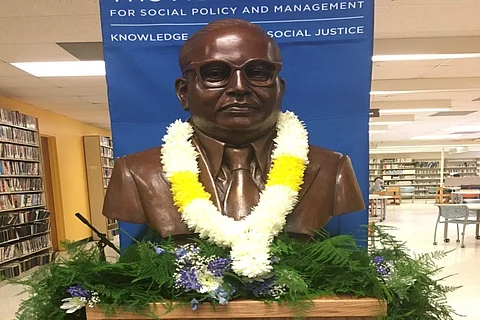

The University of Massachusetts Amherst is all set to host more than 100 academics and activists at an international annual conference on “Caste and Race Reconfiguring Solidarities: Unfinished Legacy of Dr B R Ambedkar” from May 4 to 6. The university is partnering with the Boston Study Group (BSG), an organisation based in Boston, Massachusetts.
The conference is the fourth in the series, the first of which was launched in 2015 at Brandies University. The event will also witness the unveiling of the third ever bust of Dr Ambedkar in the US, which will take place on May 5.
The event will garner a lot of attention as it is taking place amidst widespread violence against Dalits and destruction of Ambedkar’s statues back home in India from where the bust, made of brass, has been shipped.
The two-and-a-half day event will feature sessions that will discuss Dalit cultures of resistance, student movements, and caste and race problems in contemporary society.
BSG is a collective of first generation Dalit-Bahujan academics and employees that is dedicated to working towards a just and equitable society, a legacy of Dr Ambedkar. Started informally in 2006 as a small group that held critical discussions on caste problems became the BSG in 2014 with more than 20 active participants.
“If caste has to be challenged it needs to be discussed across all platforms,” says Venkat Maroju, an alumnus of the Massachusetts Institute of Technology (MIT) and one of the founding members of BSG.
Venkat is a first generation Kamsali (backward caste) hailing from Telangana’s Janagoan who studied in Telugu medium schools. He went on to do his Bachelor’s in Engineering at Osmania University, Master’s at IISc and PhD from MIT.
When asked why BSG was interested in bringing caste into the discourse, Venkat says, “Ambedkar truly said wherever we Indians go we carry our caste with us. Caste has shed its ugly shade on the Indian diaspora as well, so we thought it should be challenged.”
He adds, “Most of us have faced caste discrimination at one point of time or the other… may be while competing with poverty or with elite English medium kids in college or university back home but unfortunately the same is being replicated in different forms.”
Venkat and his colleagues such as BSG president Sanjay Bhagath, a Dalit software engineer based in MA, held discussions with Omar Khalidi, a Hyderabadi author and historian at MIT, about caste and related problems in India.
Following the discussions, the study group decided to make sure that there was a critical engagement on caste - race - gender. As a result, they did book readings, held dialogues and hosted activists and scholars to deliver lectures on caste issues. It was in 2017 that BSG partnered with Brandeis University to carry forward the unfinished legacy of Ambedkar following a similar conference and sponsored a brass bust of the Dalit leader at the university.
Talking about the conference, Venkat said, “Caste has been kept off from discussions or deliberately hidden. It is BSG’s mission to carry forward the anti-caste legacy of Ambedkar.”
Sanjay Bhagath, who hails from Maharashtra and is a first generation IITian, believes that BSG’s mission will positively impact marginalised communities. He says, “BSG will carry forward the mission to universalise the legacy of Ambedkar to positively impact the world in the context of caste- race – gender.”
BSG also leads a campaign called India for Diversity, for inclusion of Dalits and other marginalised sections in academic institutes.
The inauguration of Dr Ambedkar’s bust will be graced by the Chancellor of the University of Massachusetts, Kumble Subbaswamy, and academics like Sangeeta Kamat and Amilcar Shabazz from the university.
Amilcar Shabazz, co-chair of the conference program committee and chair of the UMass Amherst W.E.B. Du Bois Department of Afro-American Studies, in a statement said, “The problem of caste discrimination was not addressed at the 2001 World Conference Against Racism, Racial Discrimination, Xenophobia and Related Intolerance, also known as Durban I, but since then has come to be recognised as an issue of serious concern for more than 200 million people that can no longer be ignored.”
Venkat and others from the BSG feel that it is high time to address caste in a more eloquent manner, from its structures to similarities with race.
The conference, in which renowned Afro-American and Asian scholars are to participate, will see stimulating discussions on caste and race, and explore common ground between the two.
Prof Gopal Guru, editor of Economic and Political Weekly (EPW), writer and philosopher Meera Nanda, Sujatha Gidla, author of Ants Among Elephants: An Untouchable Family and the Making of Modern India, Suraj Yengde, Anand Teltumbde along with other distinguished authors such as Isabel Wilkerson, Michaeline A Crichlow and Keisha-Khan Perry are expected to attend the conference.